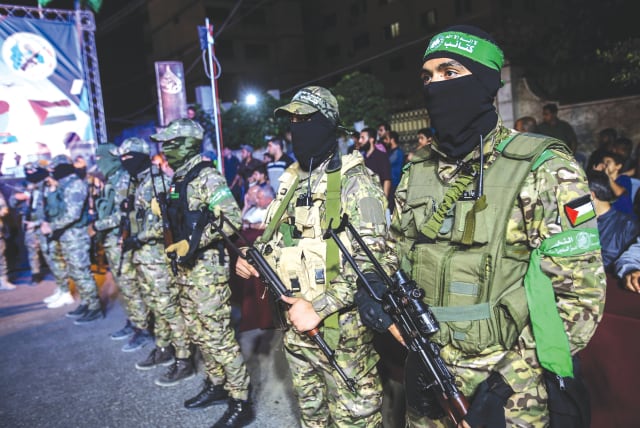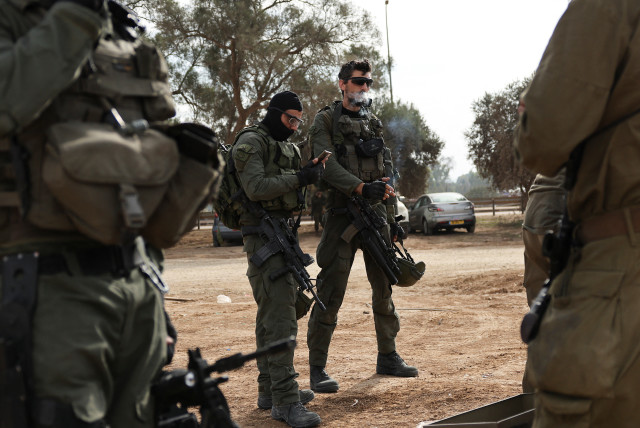Netanyahu issues three peace demands as Hamas, PIJ reject Egypt deal

Egypt proposed a "vision" that would involve a ceasefire in exchange for the release of more hostages and lead to a broader agreement involving a permanent ceasefire.
Prime Minister Benjamin Netanyahu issued three pre-requisites for peace as Hamas and the Islamic Jihad rejected an Egyptian proposal for a three-stated process to release 129 hostages held in Gaza and to end the war that began on October 7.
"Hamas must be destroyed, Gaza must be demilitarized, and Palestinian society must be deradicalized,” Netanyahu said in an article he authored and published in the Wall Street Journal on Monday.
“These are the three prerequisites for peace between Israel and its Palestinian neighbors in Gaza,” he wrote.
Hamas and the Islamic Jihad rejected an Egyptian proposal for a three-stated process to release 129 hostages held in Gaza and to end the war that began on October 7, as Prime Minister Benjamin Netanyahu vowed to work to bring them home.
He published his piece as Egypt proposed a "vision," also backed by Qatari mediators, that would involve a pause to the war of two weeks in exchange for the release of some 40 hostages.
The hope was that this would lead to a broader agreement involving a permanent ceasefire along with the replacement of the Hamas leadership in Gaza with a technocrat government. The phase of the agreement would see all the remaining hostages freed in exchange for an end to the war and the IDF’s exit from Gaza.
Egypt proposed elections while offering assurances to Hamas that its members would not be chased or prosecuted, but the Islamist group rejected any concessions other than hostage releases.
A Hamas official who visited Cairo recently declined to comment directly on specific offers of more temporary humanitarian truces and indicated the group's rejection by repeating its official stance.
"Hamas seeks to end the Israeli aggression against our people, the massacres and genocide, and we discussed with our Egyptian brothers the ways to do that," the official told Reuters.
"We also said that the aid for our people must keep going and must increase and it must reach all the population in the north and the south," the official said.
"After the aggression is stopped and the aid increased we are ready to discuss prisoner swaps," he added.
At a special Knesset debate on the hostages, Prime Minister Benjamin Netanyahu emphasized the important role the IDF’s military campaign to oust Hamas from Gaza played in securing the hostages' freedom.
“We would not have succeeded in freeing more than 100 hostages thus far without military pressure,” Netanyahu said.
“All the pressures that we are applying, diplomatic, intelligence and others, would not succeed without military pressure. We will not be able to release all the hostages without military pressure, operational pressure, diplomatic pressure. And therefore there is one thing we will not do—we will not stop fighting,” Netanyahu stated.
He recalled that he had arrived in the Knesset just one hour after making a quick trip to Gaza to speak with troops stationed there and to view the tunnel shafts located in civilian areas.
While in Gaza, Netanyahu said, “I spoke with Brigade Commander Yehuda, who commands the reserves brigade. I asked him what they most needed. He told me that there are battles all the time and that they killed terrorists, and that unfortunately, they lost several of their brothers-in-arms, but that they keep fighting,” Netanyahu stated.
“I asked him, 'What do you need the most?' And he answered, 'Time. We need time.”
Netanyahu underscored for the Knesset that “We are not stopping and we will not stop until we are victorious, because we have no country but this one and we have no other way.”
His statement combined with the positions that Hamas and the Islamic Jihad expressed in Cairo, made it seem as if the intractability of both sides, could doom any chance of a hostage deal.
But the Egyptian proposal itself was not dismissed, due to its wide framework that included aspects each side could agree to along side principled public positions they have rejected.
An Islamic Jihad delegation led by its leader Ziad al-Nakhala is currently in Cairo to exchange ideas with Egyptian officials over prisoner swap offers and other issues, but an official said the group had set an end to Israel's military offensive as a pre-condition for further negotiations.
Islamic Jihad insists, the official said, that any prisoner swap must be based on the principle of "all for all," meaning the release of all hostages held in Gaza by Hamas and Islamic Jihad in return for freeing all Palestinians jailed in Israel.
Before the war, there were 5,250 Palestinians in Israeli jails, but the number has now grown to around 10,000 as Israel has arrested thousands more in the West Bank and Gaza since Oct 7, according to the Palestinian Prisoners Association.
Pope Francis said in a Christmas message that children dying in wars, including in Gaza, are the "little Jesuses of today" and that Israeli strikes were reaping an "appalling harvest" of innocent civilians.
In the Knesset Labor party leader Merav Michaeli blasted Netanyahu for limiting his options with respect to saving the hostages as she urged him to give diplomacy a chance.
“It is impossible to topple Hamas without political steps alongside the military steps, simply impossible. This is not a theoretical debate, it is not a political debate - this is reality,” Michaeli said.
“For 15 years, Netanyahu strengthened Hamas to avoid political steps to resolve the Israeli-Palestinian conflict,” Michaeli stated.
“He is still continuing now, even though he knows that this is the only chance to bring our hostages home.
“Neither an aching heart nor a burning heart is an action plan. Netanyahu knows exactly what is required, and if he does not know, then those involved in the work of bringing the hostages home are telling him what is required.
“Netanyahu and his chorus can keep talking, but there is no other solution. You have never presented another solution and you don't have one today either,” she said.
“What is required is a political agreement to resolve the conflict. What is required will be long, painful and excruciating, but this is the only solution that will ensure the existence of the State of Israel and it is the only thing that will bring the hostages home now. Because there is no time. No time. The thing we lack most now is time. We must bring them home right now.”
Jerusalem Post Store
`; document.getElementById("linkPremium").innerHTML = cont; var divWithLink = document.getElementById("premium-link"); if (divWithLink !== null && divWithLink !== 'undefined') { divWithLink.style.border = "solid 1px #cb0f3e"; divWithLink.style.textAlign = "center"; divWithLink.style.marginBottom = "15px"; divWithLink.style.marginTop = "15px"; divWithLink.style.width = "100%"; divWithLink.style.backgroundColor = "#122952"; divWithLink.style.color = "#ffffff"; divWithLink.style.lineHeight = "1.5"; } } (function (v, i) { });

